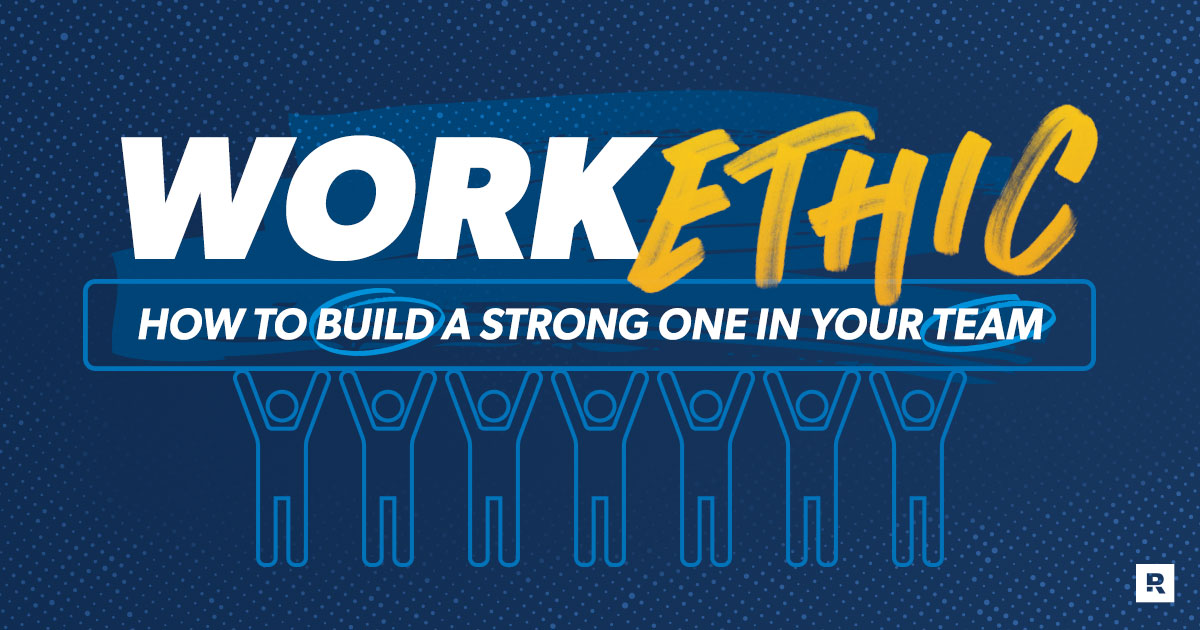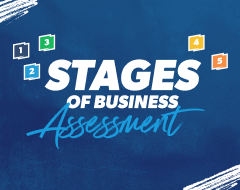
Why do some people hit their goals and take new ground like it’s second nature, while others spin in circles or just plain stay stuck where they’re at? That’s a loaded question, but one thing’s for sure: Steady success takes hard work. Beauty-business titan Estée Lauder put it this way: “I never dreamed about success. I worked for it.”1
As a business leader, you know the importance of hard work too. But developing a whole company culture around a strong work ethic isn’t easy. So, let’s answer a few questions: What is worth ethic, why is it important, and how can you encourage a strong work ethic on your team? Roll up your sleeves and let’s jump in!
- What Does Work Ethic Mean?
- Why Is Work Ethic Important?
- Strong Work Ethic Examples
- How to Build a Strong Work Ethic in Your Company Culture
What Does Work Ethic Mean?
A simple work ethic definition is: a set of morals, principles and values that guide our approach to work. But it’s more than that, right? It’s our character and drive that help us get stuff done. Work ethic is where dedication meets determination. It shows up big time in our personal brand—how we behave and even how we look. Here are a few personal traits you’re likely to notice in someone who has a good work ethic:
- Manners: They treat others the way they want to be treated.
- Attendance: They show up faithfully when and where they’re supposed to be.
- Attitude: They’re optimistic, helpful and A-game ready.
- Appearance: They don’t have to be a fashionista, but they should follow company dress standards and show up clean and confident.
- Communication: They know when to speak up, listen and ask questions.
- Cooperation: They work well with others, respect the chain of command, and use feedback, conflict and stress to grow stronger in their role.
- Productivity: They follow instructions, manage their time well, and see projects through.
You might already have a mental picture of what a poor work ethic looks like—for example, coming in late, taking long breaks, doing the minimum, and goofing off on company time. That’s the last thing you want when you’re trying to build a great business. Sure, everybody has off days. But when an off day becomes a lifestyle, that could signal a bigger problem—a poor work ethic.
Ready to Level Up Your Business?
Find out your Stage of Business with our free assessment and get additional resources to help you level up by focusing on the right things at the right time.
Why Is Work Ethic Important?
When you think of Thomas Edison, you probably think brilliant inventor. But Thomas Edison would say he was just a hard worker. Somewhere in between masterminding thousands of inventions like the lightbulb, phonograph and entire electric power industry (talk about an overachiever), Edison shared his secret to success: “The three great essentials to achieve anything worthwhile are, first, hard work; second, stick-to-itiveness; third, common sense.”2
You heard it from Edison: A good work ethic sets you up to do worthwhile work—work that matters. And no matter if you’re considering its benefits for you or for your team, hard work helps everyone:
- Overcome challenges and be productive
- Achieve business and personal goals
- Build a reputation for integrity and reliability
- Get amazing new opportunities to do more work they love
- Create a motivating and fun company culture
- Attract other hard workers to their team
- Serve others better
- Experience a greater sense of value and purpose
As the saying goes, “can’t” never did anything, but a can-do attitude does a whole lot of good!
Feeling the Strain of Poor Worth Ethic?
Despite all the benefits of a working hard, words like can-do attitude, ambition and work ethic have become bad words in some company handbooks. Not everyone seems to want to work hard—or at all.
You probably thought running a business sounded fun—until you realized it would actually run you. Discover the EntreLeadership System—the small-business road map that takes the guesswork out of growth.
You might be one of an alarming number of business leaders dealing with historic low workforce participation rates. According to our Small-Business Labor Crisis 2023 report, over one-third of all small-business owners say they can’t find workers to serve customers, restock supplies, run production lines, transport products, or do thousands of other jobs that allow them to operate their businesses as usual. And for companies with 50 or more employees, nearly half (47%) say they can’t find new hires to help them.3
Related article: America’s Labor Shortage: What Is It and What Can We Do About It?
That’s a big business pill to swallow. And you might be tempted to lower your work standards just to fill positions. But without a good work ethic as the foundation for your company culture, you won’t keep the hard workers you have for long. So, what can you do to build a culture that attracts, trains and keeps top performers? Start by taking a fresh look at your company values.
Related article: What Is Company Culture?
Strong Work Ethic Examples
Values are the guiding principles and beliefs that drive your business forward. You reinforce them by what you reward and what you tolerate, and they impact the attitudes and behaviors of every team member. That’s why your company values are such a big freaking deal. They tell your team members what’s expected (and accepted) and show the world what you stand for.
So, if you don’t have values in place, take some time to wrestle yours out on paper and make sure they communicate how important a good work ethic is to your business. For inspiration, take a look at these examples from Ramsey Solutions’ core values to see how values and work ethic connect:
- Excellence in the Ordinary: We are faithful in the little things.
Integrity - Marketplace Service: If we help enough people, we don’t have to worry about money.
Fairness and Loyalty - Momentum Theorem: We know that focused intensity over time, multiplied by God, creates unstoppable momentum.
Focus and Productivity - Never Give Up: We impose our will on the marketplace.
Dedication and Determination - Self-Employed Mentality: We all care and take responsibility like we own the place.
Accountability and Care - No Gossip: We pass negatives up and positives all around.
Respect and Camaraderie - Righteous Living: We believe character matters. All the time.
Responsibility and Trustworthiness
As you look at your values, you’ll want to think beyond catchy sayings. To guide and motivate others, your values need to be real-life, everyday principles your whole team and everyone you serve knows you’re serious about.
Related article: What Are Company Values and How Do You Define Them?
How to Build a Strong Work Ethic Into Your Company Culture
Once you’re confident your values support the work ethic you want, start spreading the word. Here’s how to improve work ethic in your company and on your team:
Be direct about your values and culture in the hiring process.
Your standards and expectations should be clear from the first interview. For example, if doing the right thing even when no one is watching is a company value, talk about it. You might even give specifics for how that applies to work hours, meeting deadlines and limiting personal work on company time.
You can also learn a lot about a job candidate’s work ethic by asking certain interview questions. Here are a few to guide your conversation.
Interview Questions Related to Work Ethic
- Innovation and Reliability: Explain a time you were chosen for a special project or challenging task.
- Service and Trustworthiness: Give an example of when you went beyond your normal responsibilities to meet a deadline or handle an important issue.
- Commitment and Achievement: Name any awards or recognitions you’ve received that show how well you see your work through.
- Integrity and Honesty: Talk about a mistake you made and how you resolved it.
Related articles:
How to Hire Employees: 12 Component to a Good Hire
How to Deal With an Underperforming Employee
Create a strong orientation and onboarding program.
As you welcome and train new team members, revisit your values, expectations and policies. More is caught than taught, so the people they shadow and learn from should be shining examples of the work ethic you want.
Related article: How to Create an Onboarding Plan Your New Employees Will Love
Use 1:1s and team meetings to clear the way for success.
To be unclear is to be unkind. When team members ask questions and share concerns, use your values as the basis for your answers. For example, if someone on your sales team is worried about not hitting their goal, talk first about the bigger picture of helping customers solve problems (aka Marketplace Service). That will make it way easier to brainstorm changes in their sales approach. In team meetings, remind team members of the mission and how their roles fit into it so they’re inspired to work hard for something that’s bigger than themselves.
Related article: How to Communicate Effectively
Provide tools, resources and training.
It’s never fun to waste precious work time scrambling to get the computer, software, keycard, passwords or contact details you need to do your job. Help your team members help you by making it easy for them to get the tools and training they need to be a rock star.
Show gratitude.
Sometimes work ethic slips when team members don’t feel valued. Let them know where they’re crushing it and offer specific appreciation for a job well done.
Related article: How to Show Gratitude to Your Team
Incorporate team-building activities into your culture.
Let’s be real: All work and no play is a grind. But laughter is good for the soul—and for building unity. Whether it’s Fun Friday games, an all-team outing, or free pizza for lunch, learn what activities are big wins with your team and add them to their calendars regularly.
Related article: 10 Easy Ways to Show Employee Appreciation
Be a leader people want to follow.
Remember what we said earlier about more is caught than taught? That’s especially true of what your team sees in you. So model the character you want to shine through in them.
Related articles:
What Is Servant Leadership?
Employee Empowerment: Why It Matters and 12 Ways to Empower Your Team
What’s Next: Work Hard at Working Hard
Ultimately, work ethic is a choice. Some people turn up their sleeves, some turn up their noses, and some don’t turn up at all. But your company is only as great as the people on your team. So hiring well and creating a culture of worthwhile work is important at every stage of business—whether you’re a Treadmill Operator, Pathfinder, Trailblazer, Peak Performer or even a Legacy Builder.
Related article: EntreLeadership: What Are the 5 Stages of Business?
If you’re not sure which stage you’re in, check out our EntreLeadership Stages of Business framework. You can also learn more about the Stages of Business and how to inspire a strong work culture by listening to The EntreLeadership Podcast—where you’ll get real-life leadership insight from respected leader and small-business expert Dave Ramsey.


